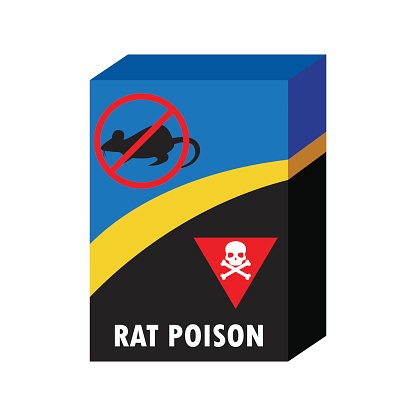
by Kerry McKinney, DVM
Among the toxins most commonly ingested by dogs and cats are rodenticides, commonly called “rat poison,” which in the US now comes in block or paste form. This year the manufacturer of d-CON, one of the most popular rodenticide brands, is changing the active ingredient in their products away from anticoagulants (blood thinners) to something far less easy to treat.
What does this mean for pet owners? Until fairly recently, most rodent control poisons used an effective second generation anticoagulant as the active ingredient. One advantage of anticoagulant types of poison is that, in case of accidental ingestion such as when eaten by a pet, it is easily treated by a veterinarian if discovered early. Treatment includes decontamination and vitamin K-1 as an antidote, and blood and/or plasma transfusions if necessary. The vast majority of pets survive.
So why the change? The Environmental Protection Agency changed their regulations in 2011 to disallow second generation anticoagulants for residential “consumer” use (though it’s still available to professional exterminators and for agricultural applications).
In response to the EPA regulations, many manufacturers kept the same brand name but changed the active ingredient to either cholecalciferol, bromethalin, or first generation anticoagulants (which provide much less effective rodent control but are still easily treatable in case of accidental ingestion).
Cholecalciferol (Vitamin D3) is what is now in d-CON. It acts by affecting calcium and phosphorus metabolism, leading to acute kidney failure in the days following ingestion. There is no antidote to cholecalciferol toxicity. Aside from decontamination (inducing vomiting, pumping the stomach, activated charcoal) and aggressive IV therapy to try to prevent kidney injury, there is no treatment.
Bromethalin is a neurotoxin and its ingestion leads to tremors, seizures, paralysis, and death when ingested in toxic amounts. There is no antidote for bromethalin toxicity. Treatment consists of decontamination and supportive care if clinical signs of seizures and paralysis develop. Most animals who develop clinical signs do not survive.
Any pet that is suspected or known to have ingested rodent poisons should be evaluated by a veterinarian immediately and they will need to know the active ingredient, not just the brand name. If you have to go to the ER, that means bringing the container, or whatever other identifying material you can find, along for the ride.
Recent Posts
About Us
Ann Arbor Animal Hospital is a locally-owned animal hospital operating for over 90 years in Ann Arbor, MI.
